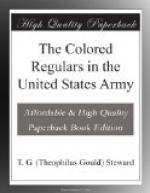as skirmishers by rushes and double time, but soon
found its front blocked by other troops. Troop
I advanced in two sections, the left being commanded
by Lieutenant Miller, joined in the attack on the
right of the enemy’s position; the right commanded
by Lieutenant Fleming, advanced on trenches between
two blockhouses, and in so doing caught up with the
rest of the troop. The first half of the troop,
after attacking the blockhouse on right of the enemy’s
position then crossed the valley and attacked the blockhouse
on the left of enemy’s position, and then moved
forward with the First Regular Cavalry and First Volunteer
Cavalry, until the troop assembled as a whole.
When it reached the place of intrenchment there were
altogether about one hundred men at that point of the
ridge, consisting of men from the Tenth Cavalry and
of the Rough Riders. It is claimed by Lieutenant
Anderson, who commanded Troop C, and who made his
way to the front on the right of the line, that after
coming up on the second hill and joining his troop
to the left of Troop I, Colonel Roosevelt and part
of his regiment joined on the right of the Tenth,
and that he reported to him, placing C Troop in his
command. Before this time Lieutenant Anderson
had reported to Captain Jones, of Troop F, while they
were on Kettle Hill, and the Two troops, F and C, had
been formed in skirmish line and moved against the
second blockhouse. In this movement Troop C got
separated from Captain Jones, and Anderson, with 18
men of his own troop and several from other organizations,
moved forward until he connected with Troop I, as
previously narrated. These troops, C and I, were
reported by their Colonel as having joined the First
Volunteer Cavalry. All of the troop commanders
who were immediately with the men bear hearty testimony
to their good conduct. Captain Jones, commanding
Troop F, says: “I could only do justice
to the troop by mentioning by name all who were engaged,
not only for their bravery, but for their splendid
discipline under the most demoralizing fire.”
Lieutenant Fleming, commanding Troop I, says:
“The entire troop behaved with great gallantry.
Private Elsie Jones particularly distinguished himself.”
Captain Beck, commanding Troop A, says: “The
behaviour of the enlisted men was magnificent, paying
studious attention to orders while on the firing line,
and generally exhibiting an intrepidity which marks
the first-class soldier.” Lieutenant Hughes,
who commanded the Hotchkiss gun detachment, mentions
four men for conspicuous bravery and commends his
entire detachment for “spirit, enterprise and
good behavior.”




